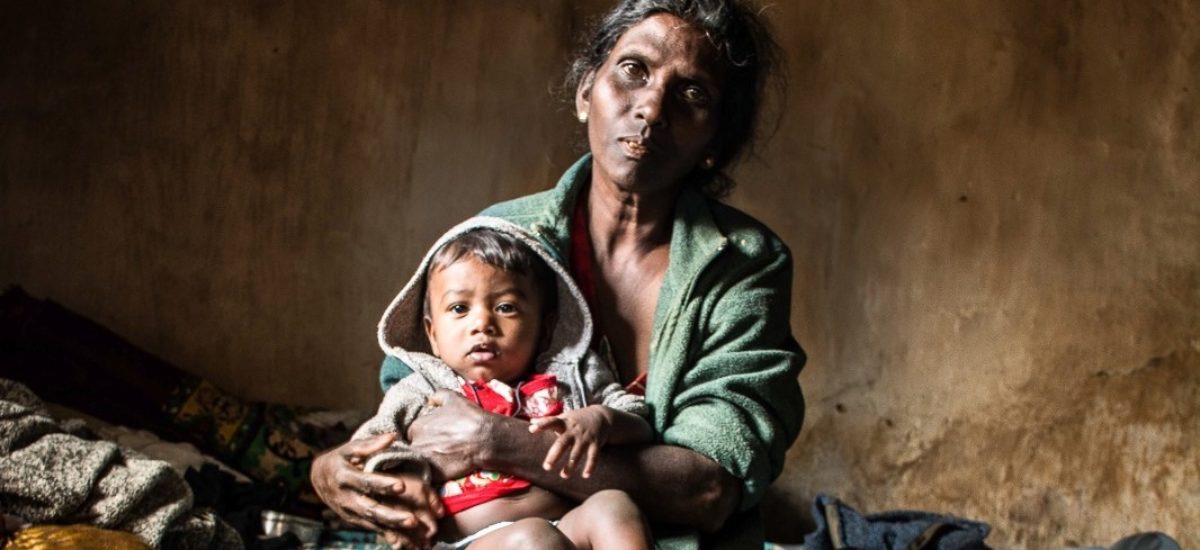Photo courtesy of Kisho Kumar
For over a decade, social activist, photographer and researcher Kisho Kumar has been working to uplift and assist the forgotten plantation community. He has documented his efforts in a series of photographs that will go on display at the end of the month in an exhibition titled Hills Of Neglect, showcasing the hardships faced by people in the plantation sector.
The plantation sector is vividly different from other sectors and is yet to be shown empathy and true care.
Female workers leave home for work by 7 am and come home by 5 pm to avoid the dark for lack of safety. Housing is built differently for the plantation sector where there is a common ceiling for multiple houses.
Parents send their female children to school with the hope of ensuring a stable future. However the girls do not show interest in their studies due to poverty and the lack of awareness.
In many cases, family members have been negatively affected by mothers migrating for work. Children are unable to prosper without being nurtured by both parents. Given that parents who work on the tea estates are uneducated, they lack the understanding of the importance of education.
It is no surprise that, given their conditions, workers forsake the plantation for brighter prospects overseas. This unfortunate choice has resulted in a generation of children raised by their grandparents.
The perception of going abroad for work to earn a livelihood is with the belief of the ability to eradicate poverty while dreaming of better futures for their families. This is embedded very strongly in the community, resulting in trauma and daily tragedies that have unfortunately become the norm.
In the late 19th century, estate workers were brought from South India to meet the the demand for labour. The descendants of the migrants co-exist and continue in the footsteps of their ancestors occupationally. Individuals who are expected to be leaders with the power to make sustainable change pay inadequate attention to the development, quality and standard of living of this community as their livelihood and health continue to deteriorate. Although estate workers continue to be of importance for the sustainability and profitability of large export firms, solutions in support of their socio-economic and health issues are overlooked.
According to the Family Health Bureau of the Public Health Department, 20,000 teenage pregnancies occur each year in the estate sector, accounting for 16-18% of all teenage pregnancies, due to poverty, alcoholism, unstable families and a lack of proper sex education. With the absence of the mother who is working abroad in some cases, poverty or lack of security and support force female children to stay silent about their situation.
This vicious cycle needs to be managed. Mothers of the teenage victims, in some cases, also faced the same abuse or married early. The lack of education, exposure and individual growth results in the warped perception of believing this to be normal. Marriage before a suitable age is not looked down upon in the community although doctors advise delaying childbearing to the early 20s when women would be more of sound mind and physical capability to nurture children better. Last year’s Family Health Bureau report revealed that even children younger than 11 years old were becoming victims.
According to a survey we carried out, the school dropout percentage was 52%, with statistics showing a higher percentage of female than male dropouts. This contributed to high teenage pregnancies. Another reason was that abandoned tea estates have become home to leopards and attacks have increased although they used to be a rarity. While the attacks do not cause much physical harm to the seasoned community, they hinder children’s education with students missing a week of school after a leopard is seen on the footpaths.
In a community where everyone is expected to do the same and follow the same path in life, the lack of opportunities not only kills many children’s dreams but also forces them to abandon school and become unskilled labourers at a young age. Forced into uniformity, with the creative arts fading, the nation is losing brilliant minds to the vast endlessness of the estates.
The Hills of Neglect will be open from March 31 to April 2 at the Sapumal Foundation, 32/4 Barnes Place, Colombo 7.

